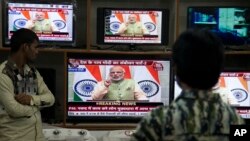Indian Prime Minister Narendra Modi announced a series of incentives to the poor, farmers, women and small businesses on Saturday in a New Year's address, and defended his recent decision to abolish high denomination bank notes.
The televised speech was widely seen as an opportunity for Modi to shore up support after a radical move on Nov. 8 to withdraw all 500 and 1,000 rupee bills, accounting for 86 percent of currency in circulation.
Millions of Indians were forced to queue outside banks for hours to deposit old money and withdraw as much new currency as was permitted, causing widespread anger and raising concerns about India's economic growth in the current quarter.
The so-called "demonetization" was designed to crush India's huge shadow economy, increase tax revenues and promote the use of bank accounts and digital transactions, but perceptions that the ambitious operation was botched have hurt Modi's standing.
It comes only weeks before Uttar Pradesh, India's most populous state with 200 million people, holds an election that will test whether the popular leader has been significantly weakened.
Modi praised Indians for their forbearance.
"In this fight against corruption and black money, it is clear that you would like to walk shoulder to shoulder with us [the government]," Modi said.
"For us in government, this is a blessing ... Corruption, black money, and counterfeit notes had become so rampant in India's social fabric, that even honest people were brought to their knees."
In welcoming news for Modi's government, State Bank of India, the country's largest lender by assets, announced on Sunday it would cut lending rates by 90 basis points, after a surge in deposits in old notes.
Lower lending rates could increase credit growth and spark a revival in private investments.
No ‘big bang offering’
On Saturday Modi had urged banks to do more to increase lending for the poor, while announcing a slew of measures including an offer of a 4 percent discount on interest rates for home loans for up to 900,000 rupees ($13,200) taken out in 2017 by middle class Indians.
Modi also said the government would increase credit guarantees for small businesses and provided additional incentives for digital transactions.
There were steps to help pregnant women and senior citizens, as well as financial support for farmers, an apparent bid to win backing among the huge rural population of Uttar Pradesh that has been hit hard by the cash overhaul.
Modi did not say how the government would pay for the measures, although economists said the package was unlikely to be too costly. It was unveiled as the government gears up to announce its annual budget, probably some time in February.
"It's clear that Modi is chastened and he had no big bang offerings today," said Mohan Guruswamy, chairman of the independent economic think tank Centre for Policy Alternatives. "He is clearly doing this to win back political support."
The Uttar Pradesh poll will be a litmus test for Modi and his ruling Bharatiya Janata Party, and will go some way to determining the prime minister's chances of winning a second term in office in national polls scheduled for 2019.
While he has introduced several major reforms to Asia's third largest economy, the cash ban is seen as his biggest political gamble to date.
Members of the main opposition Congress party were quick to criticize the speech.
One senior member, Prithviraj Chavan, said the address was vague and lacked accurate accounting details.
"It was his day to present a report card and specifically disclose the benefits of 'demonetization', but clearly the entire drive has been a failure," he said.
In his speech, Modi sought to cast the move as something all Indians should support.
"I urge all parties and leaders to move away from a 'holier than thou approach,' to come together in prioritizing transparency, and take firm steps to free politics of black money and corruption."









